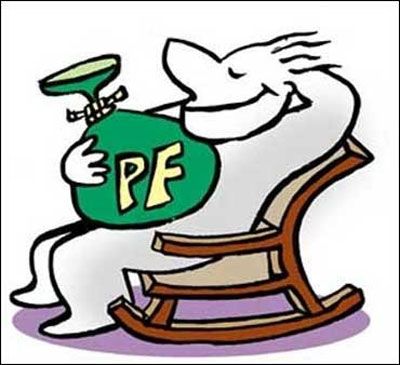 | « Back to article | Print this article |
The proposal is to tax the interest accrued on PF contributions made after April 1, 2016.

Clearing the air on taxing provident fund withdrawals, the government on Tuesday said PPF withdrawals will continue to be fully exempt from tax and only interest accruing after April 1 on 60 per cent of the contributions made to Employee PF will be taxed.
All contributions and interest accrued to employee provident fund (EPF) before April 1, 2016, will not attract any tax on withdrawal. Withdrawal of principal amount contributed to EPF after April 1 would also remain exempt from any tax.
It is only the interest on contributions made after April 1, 2016 which will be taxed, Revenue Secretary Hasmukh Adhia told PTI in an interview.
"There is no change in the status of public provident fund (PPF). EEE (tax exempt at the time of contribution, tax exempt on returns and tax exempt on withdrawals) scheme will continue for PPF," he said. "There is no 40 per cent limit on PPF. It will be 100 per cent exempt".
Adhia said out of the 3.7 crore active contributors in EPF, about 70 lakh corporate sector employees with high salary would be impacted by the proposed taxation of EPF interest on withdrawal.
"There are about 3 crore people whose monthly income is less than Rs 15,000. They are called eligible members of EPF. For this 3 crore people, there is going to be no change in status of taxation. They can withdraw their 100 per cent corpus when they retire without any taxes," Adhia said, adding that the distinction would be made clear in the notification.
The Budget 2016-17 proposed to tax interest on 60 per cent of EPF withdrawal. However, the withdrawn amount would be totally tax exempt if it is re-invested in annuity pension products.
"The purpose is not to mobilise revenue. We want people to move towards a pension society. So we have given another incentive wherein the investment in annuity product will be tax exempt. Annuity product was always taxable. But here, even after death of a person when the money is transferred to legal heir, we have made it tax exempt," Adhia explained.
"We are worried about people blowing off the entire 100 per cent amount on retirement and not investing in pension products. Otherwise, the responsibility comes on government to take care of healthcare," Adhia said.
Explaining further Adhia said the government proposes to change the provision not to take tax from salaried class, but to help people plan for retirement better.
"We are saying, 40 per cent of it (EPF amount) will be available at the time of retirement. For the remaining 60 per cent, we want to encourage you to invest in annuity products. So if your corpus is Rs 1 crore, Rs 40 lakh you withdraw and use it for house construction or other work... Rs 60 lakh you invest in annuity so that you keep getting pension," he said.
However, central trade unions have opposed the Budget proposal to tax EPF withdrawals and as many as 11 of them have planned to go on a nationwide strike on March 10 to protest against government's unilateral labour reforms and anti-worker policies including taxation of EPF withdrawals.
"This is an anti-worker budget proposal. Taxing PF means double taxation. PF is deducted from a salary on which workers have already paid tax... Tax should be imposed on new income. PF accumulation are not generated or new income," BMS General Secretary Virjesh Upadhyay said.
He said BMS would write to Prime Minister Narendra Modi and Jaitley to protest against these proposals and demand to roll those back.
All India Trade Union Congress General Secretary Gurudas Dasgupta said this issue would be raised by left parties in Parliament while debate on the Budget.
At present, social security schemes run by retirement fund body EPFO fall under Exempt-Exempt-Exempt scheme in which deposits, accrual of interest and withdrawals are tax free.
Chartered Accountancy firm Nangia & Co said the current tax structure of National Pension Scheme (NPS) was Exempt-Exempt-Tax, which was at a sharp disadvantage to the other major retirement products such as the Employees Provident Fund (EPF) and the Public Provident Fund (PPF).
"To remove the anomalies and inconsistencies in the taxation of the NPS, the Government has given partial relief by giving exemption of 40 per cent at the time of withdrawal in order to encourage retirement savings," Nangia & Co Executive Director Neha Malhotra said.